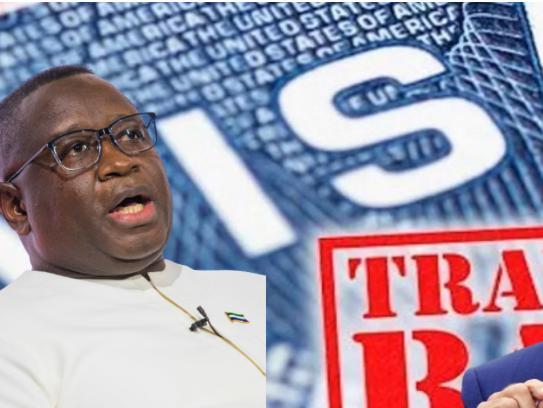Africa-Press – Sierra-Leone. On June 4, 2025, U.S. President Donald Trump signed a proclamation instituting a new travel ban, restricting the entry of Sierra Leonean nationals for tourist, student, business, exchange, and immigrant visas effective June 9, 2025. The policy targets countries with high visa overstay rates, vetting deficiencies, and weak repatriation cooperation. Sierra Leone’s visa overstay rate stands at 15.4% for B‐1/B‐2 visitor visas and 35.8% for F/M/J student visas.
What It Means for Entertainment
Sierra Leone, rich in history, rhythm, and resilience, is steadily carving out a space on the African entertainment map. From music and film to comedy, fashion, and content creation, the country’s creative pulse grows stronger every year.
Music remains the most vibrant segment of the nation’s entertainment industry. However, the new visa restrictions present several critical challenges:
1. Emerging Isolation from U.S. Opportunities
The visa ban limits access for Sierra Leonean artists, producers, filmmakers, and content creators seeking to attend U.S. music festivals, enroll in film schools, or hold business meetings. While existing visa holders remain unaffected, new applicants face indefinite restrictions in key visa categories.
Organizations like the Sierra Leone Association of Artists and Musicians (SLAAM), a U.S.-based nonprofit, have long championed the visibility of Sierra Leonean talent in the mainstream American entertainment industry. In 2023, SLAAM invited renowned folk artist Fantacee Zee to perform in the U.S. an opportunity that would now be blocked by this ban.
Similarly, popular comedian Richie Obama performed at the 8th edition of the AWOL Awards on September 2, 2023, at the Arundel Live Casino Ballroom in Maryland. Events like these are now out of reach for emerging entertainers.
2. Disrupting Education & Training Pipelines
SLAAM also functions as a professional trade organization, committed to empowering Sierra Leonean creatives through training, marketing, and industry integration. With the ban in place, young musicians and filmmakers lose access to U.S.-based mentorship, residencies, and educational programs that could have sharpened their skills and elevated their careers.
3. Loss of Networking & Collaboration
The U.S. has long served as a global hub for creative networking and cross-border collaboration. Without the ability to travel, Sierra Leonean entertainers must now pivot to digital platforms, regional partnerships, and diaspora-driven networks to maintain momentum.
In 2024, the 8-piece band TELEM: Uncommon Sound, led by Kate Krontiris-Sengeh and Solos Beat, toured the U.S., showcasing Sierra Leonean rhythms to American audiences. That kind of cultural exchange will now be far more difficult.
Also in 2024, Star Zee, one of Sierra Leone’s top female hip-hop artists, traveled to the U.S. as part of the International Visitor Leadership Program (IVLP) on Hip-Hop and Civic Engagement. These high-impact opportunities are now potentially lost for future talents.
4. Economic Consequences
The economic fallout is significant. Grants, festival earnings, brand sponsorships, and U.S. distribution deals are all jeopardized. Sierra Leonean filmmakers, musicians, and creatives may now find it harder to access the U.S. market, limiting their global exposure and income streams.
Looking Ahead
This ban arrives just as Sierra Leone’s creative industry is beginning to gain international traction with rising stars, award-winning performances, and a growing domestic fan base. But the visa restrictions expose a harsh truth: overreliance on U.S. access leaves the industry vulnerable.
Yet within the setback lies a potential turning point. Sierra Leone can choose resilience by doubling down on regional collaborations, investing in digital infrastructure, and fostering creative entrepreneurship at home.
If the nation leverages its diaspora strength, local talent, and emerging platforms, this moment could spark a more self-reliant, globally relevant, and future-proof entertainment industry.
Dictionary concludes:
“When one door closes, a people of rhythm and resolve must build their own stage. This ban may block the path but it also lights the fire beneath our creative independence.”
Source: Sierraloaded
For More News And Analysis About Sierra-Leone Follow Africa-Press






